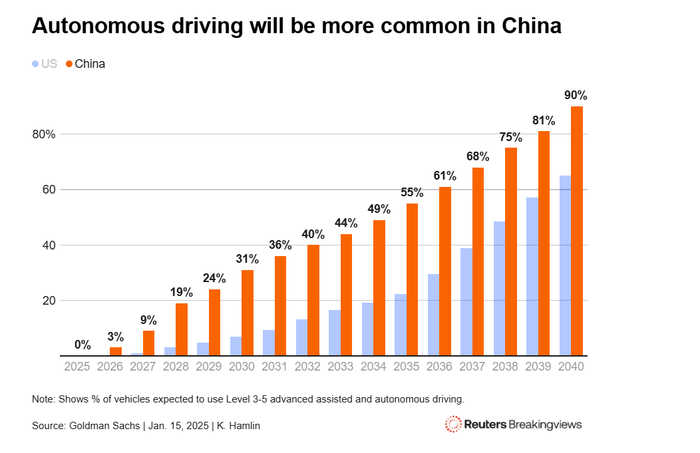Published 14:40 IST, January 15th 2025
US Engineers Decisive Split In Global Auto Market
The Biden administration has banned the import and sale of Chinese connected cars, citing data security concerns.

One of the last acts of President Joe Biden's administration is to engineer a split in the global auto market. On Tuesday, Washington imposed a ban on the sale and import of connected cars and related technology from China. Concerns over data security are compelling, even if the benefits for General Motors, Ford Motor and others of keeping out both competitors and suppliers remain debatable. That means the policy is likely to last - and could catch on elsewhere.
The Department of Commerce’s measures, which will be phased in gradually beginning with the model year 2027, aim to protect U.S. supply chains and national security, according to a release from the White House on Tuesday.
The economic rationale is dubious. Policymakers want to shelter incumbents from aggressive foreign rivals. True, there are more American pioneers to protect in autonomous driving, compared with electric cars, where Chinese marques already have an indisputable lead. Mobileye Global, founded in Israel and now owned by Intel, supplied its assisted-driving solutions to 13 of the world’s 15 leading carmakers at the time of its listing in 2022, for instance.

But preventing Ford, GM and others from tapping into Chinese expertise and supply chains is also counterproductive, increasing costs and undermining competitiveness over time. Toyota Motor-backed PonyAI and Volkswagen partner Horizon Robotics are growing rapidly as more advanced systems become the norm at home. That lends them two distinct advantages over international peers. First, made-in-China components such as lidar and radar are already much less costly, according to Bill Russo, founder of Shanghai-based consultancy Automobility. Second, Chinese providers can rapidly hone more sophisticated algorithms.
It's much harder to poke holes in the threat of “surveillance and sabotage”, which are based on the fact that the success of any assisted or autonomous driving product hinges on gathering and analysing copious quantities of data about a vehicle’s movements, driver and locale. Indeed, Beijing has succumbed to similar worries: anxiety over user data derailed taxi hailing app Didi’s planned initial public offering.
So while paranoia over China's domination of other parts of the auto supply chain, such as batteries, has not led to sweeping bans beyond American borders, this view of connected cars could more easily catch on. For now, Chinese car manufacturers and suppliers may be sanguine about the impact in the U.S., given that tariffs and other measures have already limited their market share to almost nothing. But if Washington’s counterparts in Brussels and beyond take a similar view, there is much more to lose.
Updated 14:40 IST, January 15th 2025